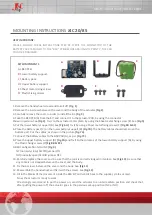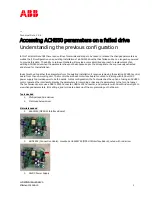
Setup mode
OPERATION MANUAL
Chapter 4
Unistat® T300 Series
V2.4.0en/22.07.20//17.12
70
Monitoring the temperature in the >Expansion vessel< [18].
Go to the “Categories Menu”.
Tap on the category “Safety”.
Tap on the category “Display OT values”. All measured safety temperatures are displayed.
Check the temperature in the
>Expansion vessel<
[18]. The degassing process is active if it in-
creases. Wait until the temperature in the
>Expansion vessel<
[18] no longer rises or even falls.
Go to the “Home” screen.
Tap on the keypad symbol next to “T
Setpoint
”.
Increase the setpoint by 10 K.
Confirm your entry by tapping on “OK”.
In the display that follows, confirm your entry again by tapping on “OK”.
The correct selection will be displayed graphically and the “setpoint” will be changed immediate-
ly. If tapping on “OK” is not correct, it will be displayed graphically for 2 seconds. Then the dis-
play will return to the “Home” screen again. Try changing the “setpoint” again.
Carry out temperature control until the temperature in the
>Expansion vessel<
[18] no longer
rises or even falls.
Check the temperature in the
>Expansion vessel<
[18] again.
Continue to increase the setpoint by 10 K increments until the temperature in the
>Expansion
vessel<
[18] no longer rises during an increase.
Now maintain the thermal fluid at the last temperature set until the
>Expansion vessel<
[18] has
reached ambient temperature.
The entire process can take several hours, depending on the degree of contamination and the
application size. Continue the control process until the temperature in the
>Expansion vessel<
[18]
has returned to ambient temperature.
Go to the “Categories Menu”.
Tap on the category “Temperature Control”.
Tap on the category “Start/Stop”.
Tap on the dialog entry “Stop degassing”.
Confirm your choice by tapping on “OK”.
Read the note and confirm by tapping on “OK”. Degassing stops immediately and the pump
continues to run for approx. 30 seconds. Wait until the pump stops.
Connect a suitable drain hose (must be compatible with the thermal fluid) to the
>Expansion
vessel drain<
[9] (if fitted) or
>Drain<
[8].
Place the other end of the hose in a suitable container, which is compatible with the thermal
fluid and the thermal fluid temperature.
Drain the
>Expansion vessel<
[18]. To do so, open the
>Expansion vessel drain valve<
[5] by turning it
counterclockwise (turn 90° left as far as it will go). Pay attention to the high temperature of the ther-
mal fluid. Please note on page 17 the section
»Proper disposal of resources and consumables«
.
Close the
>Expansion vessel drain valve<
[5]
by turning it clockwise (turn 90° right as far as it will go).
Remove the drain hose and the container. Please note on page 17 the section
.
Open the
>Expansion vessel cap<
[22] by hand.
Carefully pour new, original thermal fluid into the
>Filling port<
[17], using the filling accessories
(funnel and/or beaker). The fill level is displayed in the
>Sight glass<
[23] or on the
>Touchscreen<
[88]. Do not mix different thermal fluids. Follow the instructions for cleaning the
filling accessories on page 17 in section
»Proper disposal of resources and consumables«
.
Close the
>Expansion vessel cap<
[22] by hand.
The de-gassing process is complete.
4.4.1.3
Draining externally closed applications
Hot or very cold thermal fluid
SEVERE BURNS/FROSTBITE OF LIMBS
Before draining, ensure that the thermal fluid has room temperature (20 °C).
If, at this temperature, the thermal fluid is too viscous to be drained: Control the temperature
of the thermal fluid for a few minutes until the viscosity will allow drainage. Never control the
temperature of the thermal fluid when the Drain is open.
Danger of burns when draining thermal fluids at temperatures above 20
°C.
Wear your Personal Protective Equipment for draining.
Only drain using suitable drainage hose and collecting container. These must be compatible
with the thermal fluid and its temperature.
Summary of Contents for Pilot ONE Unistat T3*0
Page 1: ...Unistat T300 Series...
Page 2: ......
Page 3: ...OPERATION MANUAL Unistat T300 Series...
Page 4: ......
Page 7: ...OPERATION MANUAL V2 4 0en 22 07 20 17 12 Unistat T300 Series 7 Layout of the Home screen...
Page 99: ...Annex Chapter 9 OPERATION MANUAL V2 4 0en 22 07 20 17 12 Unistat T300 Series 99 9 Annex...
















































